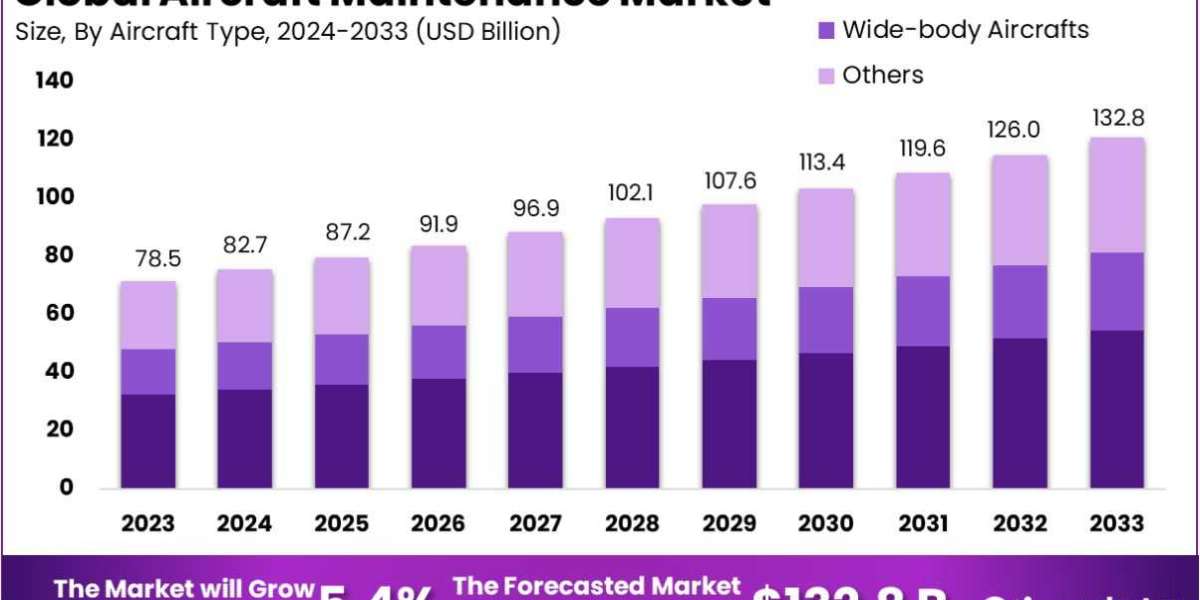The Global Aircraft Maintenance Market size is expected to be worth around USD 132.8 Billion By 2033, from USD 78.5 Billion in 2023, growing at a CAGR of 5.4% during the forecast period from 2024 to 2033.
Read More - https://market.us/report/aircraft-maintenance-market/
The Aircraft Maintenance Market plays a crucial role in ensuring the safety and efficiency of global air travel. As the aviation industry continues to grow, the demand for reliable and effective maintenance services has become increasingly important. Maintenance activities include routine inspections, repairs, upgrades, and overhauls of aircraft to ensure they meet safety standards and operate efficiently.
Growth Factors:
Several factors are driving the growth of the Aircraft Maintenance Market. First, the rapid expansion of the global aviation sector, with increasing air passenger traffic and cargo transport, has created a higher demand for aircraft maintenance services. Second, the growing fleet of aging aircraft requires more frequent and intensive maintenance, leading to increased spending in this market. Third, the rise of low-cost carriers and the expansion of airline networks have also contributed to the market's growth, as these airlines rely on efficient maintenance operations to keep costs low.
Challenges:
Despite its growth, the Aircraft Maintenance Market faces significant challenges. One of the primary challenges is the high cost associated with maintenance activities. Aircraft maintenance is a labor-intensive process that requires skilled technicians and specialized equipment, leading to high operational costs. Another challenge is the need to comply with stringent regulatory requirements and safety standards, which can be complex and time-consuming. Additionally, the market is facing a shortage of skilled labor, as the demand for qualified technicians outpaces the supply. Finally, the introduction of new, more advanced aircraft with sophisticated technology requires specialized maintenance expertise, adding complexity to the market.
Opportunities:
However, the Aircraft Maintenance Market is also ripe with opportunities. The adoption of new technologies, such as predictive maintenance and digital twins, is transforming the industry by allowing for more efficient and accurate maintenance processes. Additionally, the increasing focus on sustainability and reducing the environmental impact of aviation is driving demand for eco-friendly maintenance practices. The rise of unmanned aerial vehicles (UAVs) and the growing interest in electric aircraft are also creating new avenues for market growth. Furthermore, the expansion of maintenance, repair, and overhaul (MRO) services in emerging markets presents significant growth potential.
Emerging Trends in the Aircraft Maintenance Market
- Predictive Maintenance:
Predictive maintenance, powered by data analytics and machine learning, is revolutionizing the aircraft maintenance industry. By analyzing data from sensors on aircraft, predictive maintenance systems can forecast potential failures before they occur, reducing downtime and optimizing maintenance schedules. - Digital Twins:
The use of digital twins—virtual replicas of physical aircraft—is gaining traction. Digital twins allow for real-time monitoring and simulation of aircraft conditions, enabling more precise maintenance and reducing the risk of unexpected issues. - Augmented Reality (AR) and Virtual Reality (VR):
AR and VR technologies are being integrated into maintenance processes to provide technicians with detailed visual instructions and simulations. These technologies enhance training, improve accuracy, and speed up maintenance tasks. - Sustainability Initiatives:
With the aviation industry under pressure to reduce its carbon footprint, sustainable maintenance practices are becoming more prevalent. This includes the use of eco-friendly materials, energy-efficient processes, and the recycling of aircraft components. - Growth of MRO Services in Emerging Markets:
As air travel expands in regions such as Asia-Pacific and the Middle East, there is a growing demand for MRO services. This trend is leading to the establishment of new maintenance facilities and partnerships in these regions.
Top Use Cases in the Aircraft Maintenance Market
- Routine Inspections and Checks:
Regular inspections, such as A-checks, B-checks, C-checks, and D-checks, are essential to ensure aircraft safety and airworthiness. These inspections range from basic checks to comprehensive overhauls, depending on the aircraft's age and usage. - Engine Overhaul and Repair:
The engine is one of the most critical components of an aircraft, and its maintenance is vital. Engine overhauls involve disassembling, cleaning, inspecting, and replacing parts as necessary to keep the engine in optimal condition. - Avionics Maintenance:
Avionics systems, including navigation, communication, and monitoring systems, require regular maintenance to ensure they function correctly. This is especially important for modern aircraft, which rely heavily on electronic systems. - Landing Gear Maintenance:
Landing gear systems are subjected to significant stress during takeoff and landing. Regular maintenance of landing gear, including inspections, lubrication, and part replacements, is necessary to prevent failures and ensure safe operations. - Structural Repairs and Modifications:
Aircraft structures can suffer wear and tear over time. Maintenance includes repairing any damage to the aircraft's body, wings, and tail, as well as making modifications to improve performance or extend the aircraft's lifespan.
Major Challenges in the Aircraft Maintenance Market
- High Operational Costs:
Aircraft maintenance is expensive due to the need for skilled labor, specialized tools, and adherence to strict regulations. These costs can be a burden for airlines, especially those operating on thin margins. - Regulatory Compliance:
The aircraft maintenance industry is heavily regulated, with stringent safety standards that must be met. Compliance with these regulations requires significant time and resources, making it a challenging aspect of the market. - Skilled Labor Shortage:
The demand for qualified aircraft maintenance technicians is growing, but the supply is not keeping pace. This shortage can lead to delays in maintenance operations and increased labor costs. - Technological Complexity:
As aircraft become more advanced, maintenance processes become more complex. Technicians must be trained to handle new technologies, such as composite materials and advanced avionics, adding to the challenges faced by the industry. - Downtime and Scheduling:
Aircraft maintenance can lead to significant downtime, which can disrupt airline operations. Efficient scheduling and minimizing downtime are ongoing challenges for the industry.
Market Opportunities in the Aircraft Maintenance Market
- Adoption of Predictive Maintenance:
Predictive maintenance technologies offer significant opportunities for reducing downtime and optimizing maintenance schedules. By identifying potential issues before they become critical, airlines can improve operational efficiency and reduce costs. - Expansion in Emerging Markets:
The growing demand for air travel in emerging markets presents a substantial opportunity for MRO providers. Establishing maintenance facilities in these regions can help capture new business and meet the rising demand for services. - Sustainable Maintenance Practices:
As the aviation industry focuses on sustainability, there is an opportunity to develop and adopt eco-friendly maintenance practices. This includes using greener materials, recycling components, and implementing energy-efficient processes. - Integration of Advanced Technologies:
The integration of technologies like AR, VR, and digital twins into maintenance processes offers opportunities for improving accuracy, training, and efficiency. These technologies can help streamline maintenance tasks and reduce the risk of errors. - Growth of Electric and UAV Maintenance:
The rise of electric aircraft and UAVs is creating new niches within the Aircraft Maintenance Market. Companies that specialize in maintaining these new types of aircraft will be well-positioned to take advantage of this emerging opportunity.
Conclusion
The Aircraft Maintenance Market is a vital component of the aviation industry, ensuring the safety and reliability of aircraft worldwide. While the market is driven by the growth of air travel and the need for maintaining aging fleets, it also faces challenges such as high operational costs, regulatory compliance, and a shortage of skilled labor. However, the market is full of opportunities, particularly in the adoption of predictive maintenance, expansion in emerging markets, and the integration of advanced technologies. As the aviation industry continues to evolve, the Aircraft Maintenance Market will play an increasingly important role in supporting its growth and sustainability. By embracing new technologies and practices, the industry can overcome its challenges and continue to thrive in the years to come.



